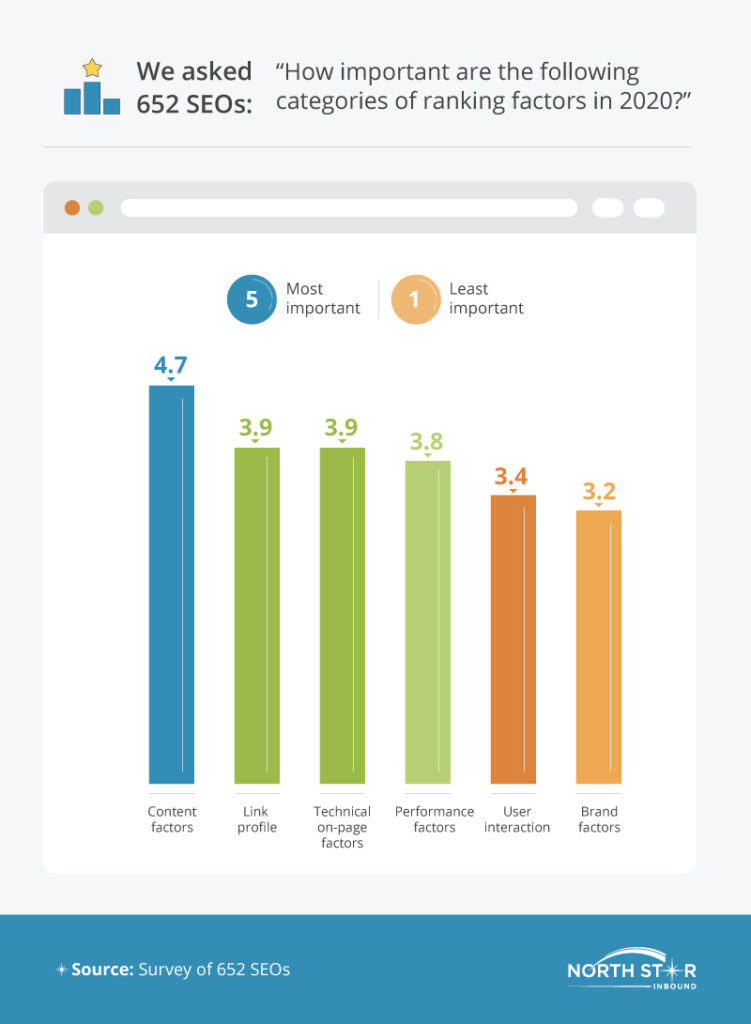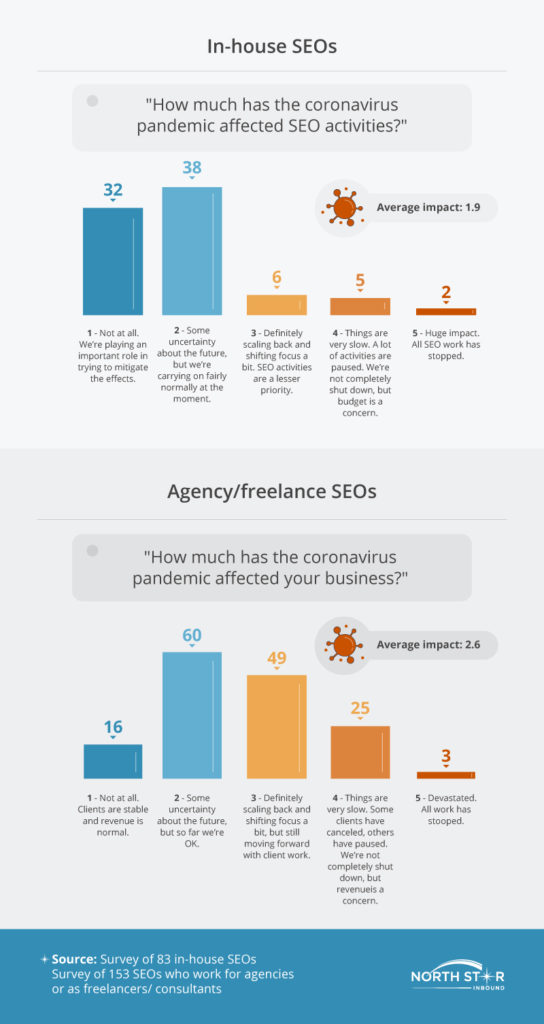Table of Contents
There are a lot of landmines when you publish any kind of article about ranking factors, not the least of which is identifying them in the first place. Are there actually 200 factors in Google’s search algorithm? Probably not, despite Brian Dean’s valiant efforts to track them all down.
We settled on 75 variables in our quest to discover what SEOs think moves the needle in 2020, but we know it’s subjective, and you may already be shaking your head. We made the most comprehensive list we could and sorted it as logically and dispassionately as we could, but like all studies of this ilk, the underlying assumptions are suspect. No one outside of Google really knows for sure. And of course, correlation is not the same as causation. So what are we hoping to accomplish here?
We asked 652 SEOs what they are prioritizing now and how it’s different from what they were focusing on a year ago. We also asked a bunch of questions about the state of the industry, SEO pricing, support for in-house SEO, and more.
We know that some pretty impressive people gave us their time, but we can also tell that some folks who took our survey are using outdated strategies. Our respondents were diverse, like the profession itself. So proceed at your own risk and take it for what it is.
You probably shouldn’t change what you’re doing based on a study like ours, but it’s always interesting to see what everyone else is doing. And for those who have been monitoring the industry for a while, it helps to document how the conventional wisdom in SEO shifts over time.
Enough jabbering? OK, let’s get to it.
Here are some highlights from our study. (In-depth blog posts with more details will follow soon.)
Which ranking factors do SEOs think are most and least important in 2020?
We took 75 factors that (most likely) influence a site’s ranking and grouped them into 6 categories:
- Content factors
- Link profile factors
- Technical on-page factors
- Performance factors
- User interaction factors
- Brand factors
Of those 6 broad categories, SEOs overwhelmingly ranked the content category highest. That has not always been the case, but SEOs agree that today, it is critical to serve users accurate, authoritative, relevant, and well-organized content. Content factors were ranked most important by agency and in-house SEOs, as well as the overwhelming majority of SEOs around the world. (We had respondents from 51 countries.)
By contrast, SEOs have to lift the brand they’re working with and don’t always have much control over broader identity factors. Although things like brand name search volume matter, brand factors overall ranked lowest.

Drilling down, we had the SEOs weigh each of the 75 ranking factors individually. These are the factors that scored highest and lowest in terms of perceived importance. SEOs weighted site architecture, having keywords in a title, and pages that cover topics in-depth most heavily.
At the other extreme, the SEOs weighed AMP usage, no-follow links, and URL length least heavily.
Of course, there were some fine points where SEOs disagreed.
For example, when it comes to content, in-house SEOs place slightly more importance than agency SEOs on content depth, a domain’s perceived E-A-T, and the magnitude of updates. Agency SEOs place slightly more importance on the domain’s overall quantity of content and the presence of multimedia than their in-house peers do.
Young SEOs with less than 2 years of experience place higher value on frequency of new content production than SEOs with 6-10 years of experience, who are more likely to focus on depth and authority.
SEO trends – 2020 vs. 2019
In 2019, SEOs put a lot of effort into technical on-page factors like keywords in titles, H1s, title tags and URLs, the authority of internal links, and broken links.
In 2020, those activities have diminished while others like link profile and user interaction factors have grown in importance.

SEO budgets in 2020
Pre-COVID SEO budgets were steady or higher than last year’s nearly across the board, although the pandemic has taken a toll since.

In March, many in-house SEOs told us they were working with annual budgets in the six figures.
- The average 2020 SEO budget for businesses with fewer than 250 employees was $282,800.
- The average 2020 SEO budget for enterprise business (250+ employees) was $694,478.
- Companies at the upper end pulled the averages up quite a bit. Median budgets were more modest. The median 2020 SEO budget for businesses with fewer than 250 employees was $45,000 and for enterprise businesses was $180,000.
More than half of the in-house SEOs we surveyed (51.2%) said their budgets increased this year. (47.5% of enterprise SEOs got more money to work with; 54.9% of SEOs at businesses with fewer than 250 employees got increases)
The median budget increase was 18% over the previous year.
After the coronavirus pandemic hit, we added questions about the impact on the industry and did some additional outreach. 84.4% of in-house SEOs surveyed in April and May said they were carrying on fairly normally and COVID-19 had not disrupted their SEO budgets or activities. 7.2% said there was a slight downshift; 8.4% said there was a large impact.

In-house SEO in 2020
Overall, the typical SEO team has 2-3 people. That is true for enterprise businesses as well as smaller companies. And in-house SEOs are generally satisfied with the support they receive, particularly their tools and the expertise of their teams. However, the biggest challenge for SEOs across the board is engineering support.

An overwhelming number of in-house SEOs (81%) agreed with the statement “There is strong cooperation between SEO and other departments.” And more than two-thirds (69.1%) agreed that “Other departments see the value of SEO.”
But there is room for interdepartmental improvement. The statement that got the weakest support with only 52.4% agreeing was “Other departments solicit SEO advice early in projects.”
What agency and in-house SEOs do differently
There are some subtle differences in how agency and in-house SEOs approach the job. We found that agency SEOs assign more value to links from .edu and .gov pages. In-house SEOs are more concerned about the number of linking root domains.
Overall, in-house SEOs felt a bit more confident in their performance last year, with 48.2% calling their efforts “very successful” compared to 42.4% of agency SEOs.

When we asked what single category they focused on most in 2019, more in-house SEOs than agency SEOs focused on content factors (41.9% to 38.4%).
By contrast, more agency SEOs than in-house SEOs focused on technical on-page factors (30.6% to 24.6%).
That slight preference for technical work was also evident when we asked respondents about their specialties. Agency SEOs are more likely to consider themselves technical experts than in-house SEOs (by 22.4% to 16.5%). Probably by necessity, in-house SEOs are more likely than their agency counterparts to consider themselves generalists who do a bit of everything (54.7% to 47.8%).
What seasoned SEOs do differently than rookies
(a.k.a. What 10+ years in SEO really teaches you)
Over time, SEOs tend to pick up more technical expertise. When we asked people with different levels of experience what they specialize in, it became clear that young SEOs are most likely to start with content and gather technical insights over time. SEOs with more than 10 years of experience are nearly five times as likely to consider themselves tech experts as those who’ve been in the industry for less than 2 years (24.1% to 5.4%).

SEO Pricing in 2020
Typical retainers, project fees and hourly rates vary greatly by specialty, scope of work, and experience level. But after sifting through responses from several hundred agency and contract SEOs, we came up with medians and ranges for the industry.
Curious what other SEOs are charging? There are a huge number of variables, so take it with a grain of salt. But among those we surveyed, there were 138 agency or contractor SEOs who said they most commonly price their services through monthly retainers. The median retainer was about $2,000 a month.
There were 54 agency or contractor SEOs who said they most commonly use per-project pricing for their services. Their median project fee was about $3,750.
Lastly, we surveyed 57 agency or contractor SEOs who most commonly charge by the hour. In this group, median hourly rates were in the $100-$125 range.

Methodology
These are some of the insights we gleaned from a 2-month long survey of 652 SEOs. Our respondents included 446 men, 191 women, 1 nonbinary person, and 14 who preferred not to share their gender.
SEOs from 51 countries participated in the study. The breakdown by region was;
- 269 from the United States
- 113 from Western Europe
- 85 from the United Kingdom
- 43 from Eastern Europe/Balkans
- 39 from Australia and New Zealand
- 30 from Asia
- 21 from Canada
- 18 from Scandinavia
- 16 from the Middle East
- 12 from Central and South America
- 6 from Africa
In terms of experience, the participants reported their years working with SEO as an important responsibility as follows:
- Less than 2 years: 70
- 2-6 years: 227
- 6-10 years: 159
- More than 10 years: 196
Fair Use
This survey was a quest to find out what SEOs believe matter when it comes to rankings, not necessarily what does matter. With that caveat, it is a glimpse into what the industry is prioritizing in 2020. We’re happy to share our findings, and you may reproduce any of the images above. All we ask is that you kindly link back to this page.





